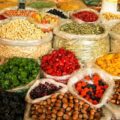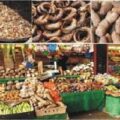By Chiagoziem Abosi
Over the past eight years, Nigeria has experienced a steady increase in the value of the dollar, impacting various sectors of the economy. The fluctuating exchange rates have had a significant impact on the cost of imported goods, including local food items, leading to a rise in overall inflation rates. This has forced local businesses, especially the agricultural sector to struggle with higher operating costs , and limited access to affordable loans.

The dollar increase is impacting food security in vulnerable communities
MrsOluwaseunTaiwo, reveals the coping mechanisms she has developed since the inception of this increase in food stuffs.
“I must say that the rising food prices has placed a significant burden on my family and me. It’s a challenging time for us all. Buying groceries and essentials is a struggle. We’ve had to cut back on so many things, like favorite snacks and some meals. It’s hard to make ends meet, especially on a fixed income. As I always say, “A bag of rice is now as expensive as a bag of cement!”
She further explained that the biggest challenge she faces is ensuring her family has enough food each week. “I’ve had to get creative with cooking and make do with what I have. I’ve even started a small garden in my backyard to grow some vegetables. It’s not easy, but it’s worth it to see my family smile when we sit down to eat together.”
Coping with the rising cost of food on a fixed income is tough. From cutting back on social events and outings, to even selling belongings to make ends meet, everyone is making sacrifices. According to Mrs. Oluwaseun, “If I could make one change, it would be to see more support for the elderly and vulnerable communities. We need access to affordable healthcare, food, and other essentials. I strongly agree that we must prioritize the welfare of our people.”

How families are coping with the rising food costs
The family of Uduak, who reside around Alade in ikejadiscussed with us how they have been surviving the food priceincreases.
For MrUduak, “As a family man living in Nigeria, I’m deeply concerned about the rising cost of food. We’ve cut back on many items, like meat and fish, which have become too expensive.”
This cut back is understandable as 50kg bag of rice costs between N72,000 to N85,000, while a kilogram of chicken costs between N4,000 to N5,000.
“We’ve replaced them with more affordable options like beans and plantains,” Mr. Uduak said.
“Wecame up with strategies to manage the increased cost of foods. We buy in bulk, plan our meals around what’s in season, and reduce our consumption of processed foods and sugary drinks.”
The family have also started shopping at local markets, where prices are more affordable. For instance, a 25-litre of vegetable oil costs between N52,000 to N54,000 at the market, compared to N60,000 at the supermarket.
“Our family’s eating habits have changed significantly. We’re eating more local foods. We have resorted to eating twice a day instead of the usual three-square meal that we were all born into. That’s how bad it has become.”
When asked what he would do if food prices continue to rise, Mr. Uduak said, “I fear we’ll have to make even more sacrifices. For now, we’re finding ways to make do with what we have and supporting each other through these challenging times.”
Local farmers struggle to keep up with rising costs
Mr Daniel Gbenga, a farmer shares his struggles in the past one year. He explained that as a local farmer, the rising costs of supplies and fuel have really impacted his farming operations this year.
“It’s been a tough time for me and my fellow farmers.The cost of supplies like fertilizers, pesticides, and seeds have gone up by about 30% in the past year alone! And fuel? Forget about it! The price of diesel has increased by over 50% in the past six months.
As a small-scale farmer, I’ve increased my prices to keep up. But this has affected my relationship with my customers. Some of them have started looking for cheaper options, which I totally understand. But it’s hard to see my loyal customers go.”
To cope with the rising costs, he started using more organic and natural methods in his farming, which he said is actually more cost-effective in the long run.
“I’ve also started selling my produce directly to consumers increasing my profit margins. Inspite of all these efforts, I’m still worried about the future of my farm. If these increases continue, I fear that I might have to shut down my farm altogether. It’s a scary thought, especially since farming is not just a business for me, but a way of life.”
Mr. Gbenga hopes that the leaders will come together to support farmers like him to survive and reduce food prices. “They can provide subsidies, loans or other incentives to help sustain our practice.”








